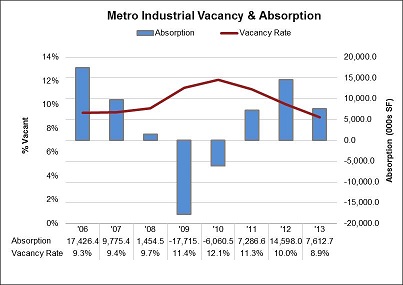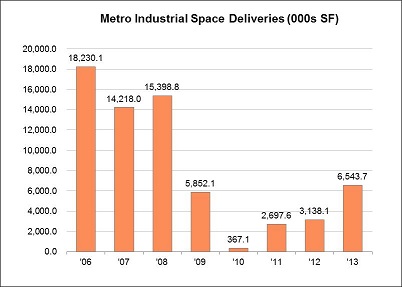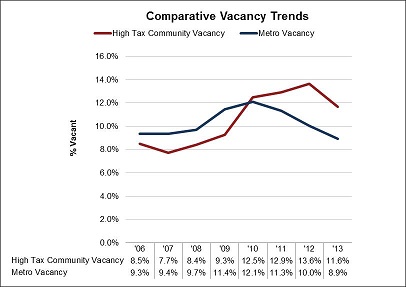(773) 763-6750
< prevnext >
 (This archived article was published in 2014. More recent data is found in the articles section of our web site). In general, the Chicago metropolitan area industrial market appears to be improving with higher transaction volumes, positive absorption levels and an improvement in occupancy levels. Low interest rates have permitted a compression in capitalization rates which is helping to support property values. Rental rates have remained flat so should interest rates start to rise, some of the gains in the industrial market could be at risk. We also note that many of the market improvements are inconsistent with some areas showing virtually no improvement. A Chicago area commercial appraiser would need a more nuanced view of the industrial market. In sections of the south suburban industrial market we continue to see negative absorption, flat rental rates, flat occupancy levels and virtually no new development. The charts below compare the industrial market conditions for the metropolitan area as a whole (left) with the 29 high tax south suburban communities that have composite real property tax rates 14% and higher (right).
(This archived article was published in 2014. More recent data is found in the articles section of our web site). In general, the Chicago metropolitan area industrial market appears to be improving with higher transaction volumes, positive absorption levels and an improvement in occupancy levels. Low interest rates have permitted a compression in capitalization rates which is helping to support property values. Rental rates have remained flat so should interest rates start to rise, some of the gains in the industrial market could be at risk. We also note that many of the market improvements are inconsistent with some areas showing virtually no improvement. A Chicago area commercial appraiser would need a more nuanced view of the industrial market. In sections of the south suburban industrial market we continue to see negative absorption, flat rental rates, flat occupancy levels and virtually no new development. The charts below compare the industrial market conditions for the metropolitan area as a whole (left) with the 29 high tax south suburban communities that have composite real property tax rates 14% and higher (right).
The high property tax towns in our analysis include: Bellwood, Burnham, Calumet City, Calumet Park, Chicago Heights, Cicero, Country Club Hills, Dixmoor, Dolton, East Hazelcrest, Flossmoor, Ford Heights, Glenwood, Harvey, Hazelcrest, Homewood, Lansing, Markham, Matteson, Maywood, Olympia Fields, Park Forest, Phoenix, Richton Park, Riverdale, Sauk Village, South Holland, Stone Park, and Thornton. The industrial absorption rates show positive movement since 2011 for the overall Chicago metropolitan market. Higher property tax communities in the South Suburban market; however, have shown strong negative absorption since 2008 and is now virtually at a break even. Vacancy rates decline from 13.6% to 11.6%, are attributable to inventory declines as properties are removed from the market due to age or condition without being replaced and not due to increased demand for space.
New industrial construction, (typically built-to-suit), have proceeded to some degree in the overall market since 2010. These south suburban communities, however, have had virtually no new construction at all in 2011 or 2013. Builders see limited opportunity for new construction when sale prices are so far below construction costs. Colliers International reports that the average asking price for an industrial building in the Chicago Metropolitan Area is $45.31 versus only $23.86 in the south suburbs, which is 47% below the metropolitan area average. Our lack luster industrial market recovery appears to be bypassing higher property tax rate south suburban locations. A Chicago area commercial property appraiser needs to recognize the substantial impact that high real estate tax rates can have on commercial property values and the overall health of the community.
2014 South Cook County Industrial Market Conditions - Chicago Commercial Appraisal Analysis
Article: (This archived article was published in 2014. More recent data is found in the articles section of our web site). In general, the Chicago metropolitan area industrial market appears to be improving with higher transaction volumes, positive absorption levels and an improvement in occupancy levels. Low interest rates have permitted a compression in capitalization rates which is helping to support property values. Rental rates have remained flat so should interest rates start to rise, some of the gains in the industrial market could be at risk. We also note that many of the market improvements are inconsistent with some areas showing virtually no improvement. A Chicago area commercial appraiser would need a more nuanced view of the industrial market. In sections of the south suburban industrial market we continue to see negative absorption, flat rental rates, flat occupancy levels and virtually no new development. The charts below compare the industrial market conditions for the metropolitan area as a whole (left) with the 29 high tax south suburban communities that have composite real property tax rates 14% and higher (right).
(This archived article was published in 2014. More recent data is found in the articles section of our web site). In general, the Chicago metropolitan area industrial market appears to be improving with higher transaction volumes, positive absorption levels and an improvement in occupancy levels. Low interest rates have permitted a compression in capitalization rates which is helping to support property values. Rental rates have remained flat so should interest rates start to rise, some of the gains in the industrial market could be at risk. We also note that many of the market improvements are inconsistent with some areas showing virtually no improvement. A Chicago area commercial appraiser would need a more nuanced view of the industrial market. In sections of the south suburban industrial market we continue to see negative absorption, flat rental rates, flat occupancy levels and virtually no new development. The charts below compare the industrial market conditions for the metropolitan area as a whole (left) with the 29 high tax south suburban communities that have composite real property tax rates 14% and higher (right).METRO INDUSTRIAL MARKET | HIGH TAX RATE COMMUNITIES |
| |
|
|
CoStar Inc., data |
|
MORE CHARTS COMPARING INDUSTRIAL MARKET DATA
| |
|
|
CoStar Inc., data |
|








